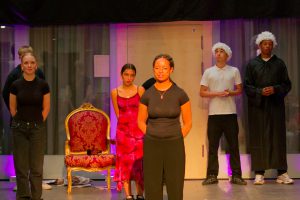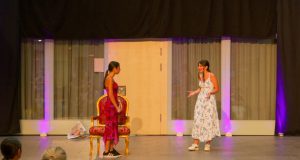
Murder or Morality?
Hinweis: Dies ist eine automatische Übersetzung des Seiteninhalts. Für verbindliche Informationen gilt der deutsche Originaltext. (English) Original anzeigen
Note: This is an automatic translation of the page content. For binding information, the original German text applies. (English) Show original
Spectators must answer this question when they are prompted to vote at the end of the play. Like a statement, all the performers of the theater course under the direction of Yasemin Cec stand on stage in a striking way and present their plea. And once again the pointed finger becomes uncomfortable, for the audience member must decide – which side of life do you actually stand on?
The theater class has taken Schiller's Sturm und Drang text as a guide to foreground questions: How quickly can one go from dreamer to perpetrator? How easily do values tip when one feels unseen, treated unfairly? Where does morality end and where does crime begin?
Actually, it is about a dispute between two brothers that forms the centerpiece of the action. While Karl, the firstborn and thus heir to the throne, roams the forests, the second-born Franz hatches a plot about the succession. He influences their father so that he ensures the disinheritance. Thus the disappointed Karl indulges in the idea of founding a band of robbers with his friends and swears an oath of loyalty. To accelerate his inheritance, Franz decides to pursue the favor of Amalia, Karl's fiancée. He sends a messenger who, in a false report, claims that Karl is dead and that his last will would be the marriage of Franz and Amalia. Karl must meanwhile withstand the intrigues within his robber band. When the father collapses, Franz believes he has reached his goal. He wants to force Amalia to marry. Karl returns and recognizes his brother's intrigues. Thereupon he orders his robber band to storm. What begins as idealism ends in violence or perhaps in justice?
Karl's robber band, with a really large group of performers who want to be rebellious and unconventional, was deftly staged. When the group storms the stage, unites and bands together – for ideals and rights – and delivers choral lines with insistence, then everyone is drawn into the spell.
Impressive is the performance of the entire group – led by a convincing and inwardly torn Karl and a scheming, power-hungry and seemingly increasingly crazy Franz. The simple stage design works well – not much is needed when the text sits well and fitting beats and lyrics support the scene changes: impressive, successful, stimulating and entertaining.
And the robbers act out of anger about the conditions and become criminals. How easily seduced and manipulable is the human being? That is the big theme and it remains relevant. To this day.
A report by Anja Heiligtag







